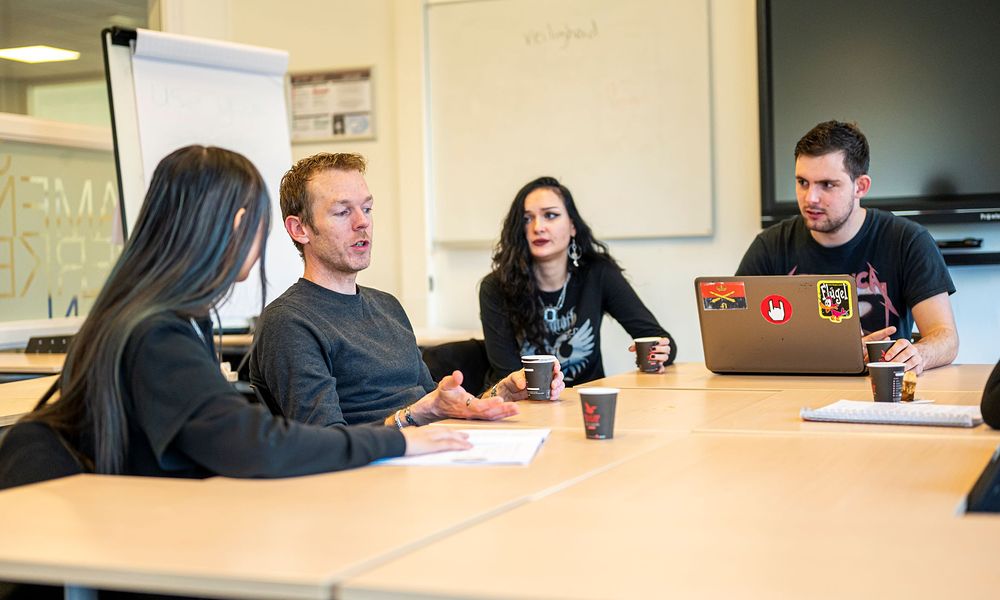Hanze tackles loneliness among students
- News

Talking about loneliness is not something you do easily. Your student time should be the best time of your life, right? Jisca Kuiper and Willem Vos show that this is not always the case. Together with students, the lecturer-researchers conducted research into loneliness among students. Willem Vos: 'It was always there, even before corona.'
'In 2019, Jisca Kuiper and I tentatively started asking our students questions about loneliness,' says Willem Vos ahead of the concluding symposium of EAST, Loneliness Approach Students. 'We were interested in the issue and wanted to link research to it. With the aim of developing an approach for students with which we can make loneliness discussable and reduce it, making students feel more comfortable and reducing study delays and drop-outs. It felt like something counterintuitive because loneliness and students are not easily linked.'
The researchers were improving the research design from the Rehabilitation Department when corona broke out. As a result, the research gained momentum. The grant was honoured and the researchers started in 2020. 'Five students who recognised the problem wanted to participate in a focus group on loneliness. What turned out, they all suffered from it. Or they had had it or still were suffering. It turned out to be a bigger issue than we initially thought.'
A year later, research by the Trimbos Institute, the RIVM and the GGD GHOR among almost 30,000 students showed that just under 80 per cent of them felt somewhat to severely lonely (Dopmeijer et al., 2021). 'It is a fundamental problem. It was always there, even before corona. Corona was at most an amplification of what was already there,' says Willem Vos.
The researchers developed an intervention that breaks the taboo of loneliness among students. With the focus group, they developed a prototype. 'This was developed into a training course, which we offered to colleagues at the Hanze. Twenty colleagues signed up. They started recruiting students within their school or academy. We collected sufficient data, for instance through theses and partial studies carried out by students. We also developed a teaching programme to make loneliness discussable in the classroom in an accessible way.'
The teaching programme is on our website. It is not only accessible to teachers at Hanzehogeschool, but is available to everyone free of charge. 'It is a two-hour lesson that you ideally give to first-year students in a mentoring class, for example after the first 100 days, when they have found their feet a bit. The manual for the lesson, also includes a one-hour light version and the programme can also be easily converted to an online version.'
The students who participated in EAST reported that the conversations helped them get a better grip on their (emotional) lives. 'They liked being able to talk openly with a tutor about something as intimate as feelings of loneliness. We already knew from the literature that loneliness is not a solitary problem. It does not stand alone and is actually always linked to other problems such as gloom or anxiety. Or with reduced motivation for school. Surprisingly, in our group, no one who suffered study-related problems, had delays or dropped subjects. Indeed, going to school was a pleasant distraction. Even in corona time, you still had a certain contact. Students we involved in our study did not get worse grades because of their feelings of loneliness.'
William sees expressing feelings of loneliness as part of the solution is. 'Feeling lonely is a valuable signal that you want more contact or connection with other people. At the same time, we see that it shouldn't last too long. The tipping point is about a year. If you feel lost and disconnected from the world around you for a year, you are at risk of chronic symptoms such as high blood pressure and increased risk of diabetes, as well as anxiety and mood disorders and drug use. So there is a momentum when you need to do something with those signals.'
'We often have the idea that we are considered weak if we are open and show our vulnerabilities, but the opposite is true. Showing your vulnerability is actually seen as something courageous and powerful. At the same time, it is implicitly an invitation to others to share their stories. Above all, let's not hide the fact that we struggle from time to time.'
How satisfied are you with the information on this page?